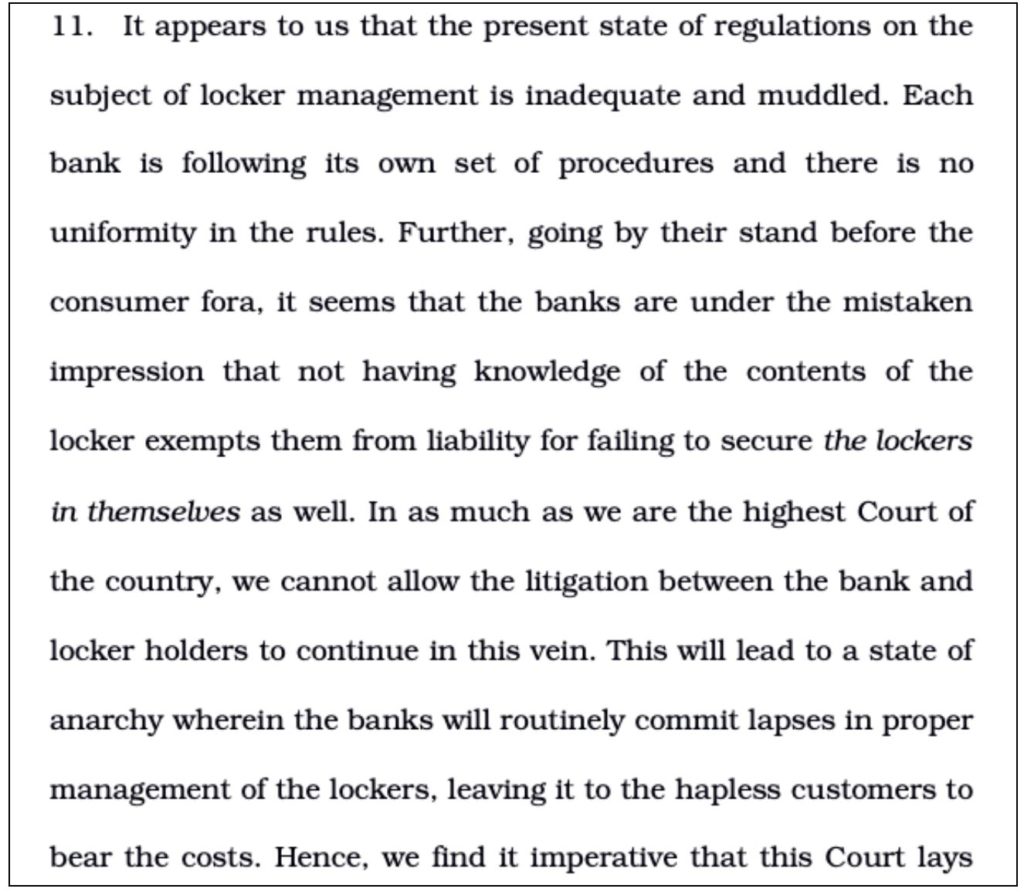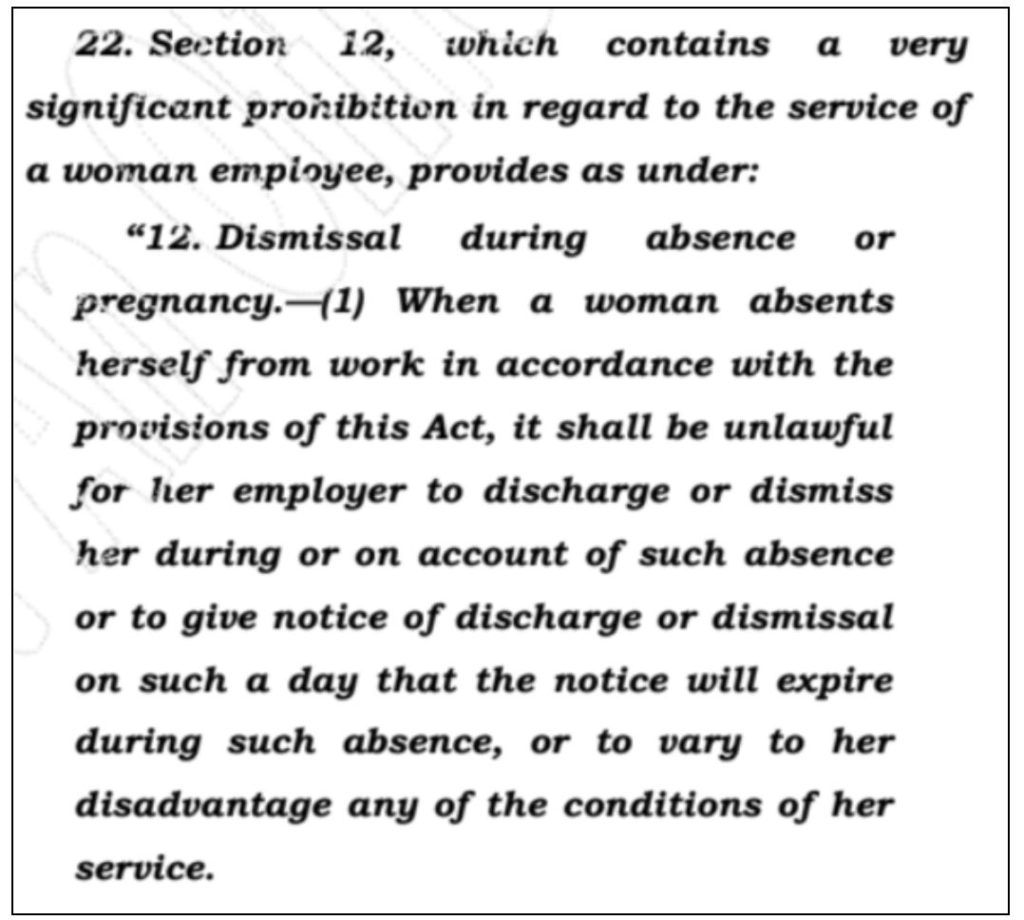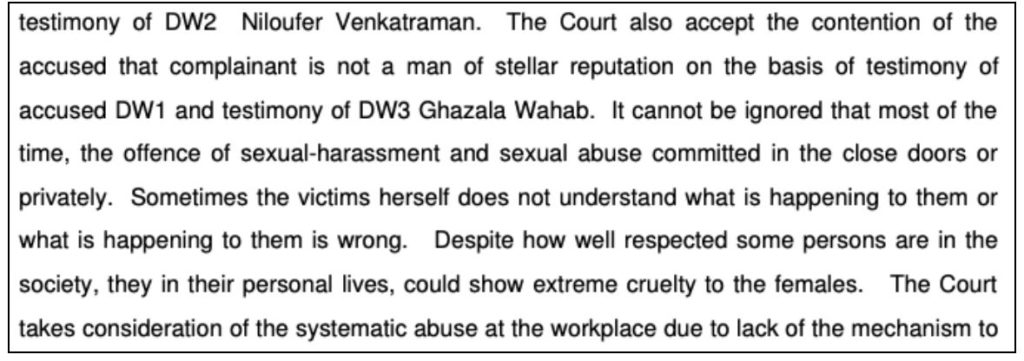In this roundup of the important court judgments, we look at directions about the duty of banks in maintaining safety deposit systems, maternity benefits to contractual employees and on women raising their voices against sexual harassment.
Supreme Court: Banks as service providers owe a separate duty of care to exercise due diligence in maintaining their safety deposit systems
In the case of Amitabha Dasgupta vs. United Bank of India & Ors., the Supreme Court (SC) held that breaking open the locker in a manner other than that prescribed under law is an illegal act which amounts to gross deficiency of service on the part of the bank as a service provider.
The following are the facts about this appeal in the SC. In the early 1950s, Appellant’s mother (since deceased) took a locker on rent in the Deshapriya Park, Kolkata Branch, and in 1970, the Appellant (complainant) was included as a joint holder. In May 1995, the Appellant visited the bank to operate the locker. However, the bank informed him that the locker was broken open in September 1994, for non-payment of rent dues for the period of 1993-1994. The Appellant claimed that such breaking of his locker was illegal since he had cleared dues for 1994-1995 in July 1994, i.e., prior to the breaking of the locker. The Chief Manager of the bank admitted to having inadvertently broken open the locker, though there were no outstanding dues to be paid, and apologized for the same.
In June 1995, when the Appellant went to collect the contents of the locker, it is alleged that he found only two of the seven ornaments that had been deposited in a non-sealed envelope. However, the bank contends that only those two ornaments were found in the locker when it was broken open. Subsequently, the appellant filed a consumer complaint before the District Consumer Forum to return the seven ornaments that were in the locker; or alternatively, pay Rs. 3,00,000/ towards the cost of jewellery, and compensation for damages suffered. The District Forum held the bank liable for deficiency of service and directed the bank to return the entire contents of the locker, or alternatively pay the Appellant Rs. 3,00,000 towards the cost of the jewellery and, Rs. 50,000 as compensation for mental agony, harassment, and cost of litigation.
On appeal, the State Commission accepted the District Commission’s findings on the question of deficiency of service. It also observed that the dispute on the contents of the locker can only be decided upon the provision of elaborate evidence and that the Consumer Forum was not equipped to undertake this evaluation. Therefore, the appellant was directed to approach the civil court for adjudication on the contents of the locker.
The SC notes that the bank inadvertently broke the Appellant’s locker, without any just or reasonable cause, even though he had already cleared his pending dues. The Appellant was not given any notice prior to such tampering with the locker. He remained in the dark for almost a year before he visited the bank for withdrawing his valuables and enquired about the status of the locker.
Thus, the bench of Justices Mohan M. Shanthangoudar and Vineet Saran deemed it appropriate to impose costs of Rs. 5,00,000/ on the Bank which should be paid to the Appellant as compensation. The judgement mentioned that this amount shall be deducted from the salary of the erring officers if they are still in service. If the erring officers have already retired, the amount of costs should be paid by the Bank. Additionally, the Appellant shall be paid Rs. 1,00,000/ as litigation expense.

The judgement highlights that the state of regulations on the subject of locker management is inadequate and muddled. Hence, the judgement lays down certain principles which will ensure that the banks follow due diligence in operating their locker facilities, until the issuance of comprehensive guidelines in this regard. Irrespective of the value of the articles placed inside the locker, the bank is under a separate obligation to ensure that proper procedures are followed while allotting and operating the lockers. The judgment laid down the following principles until comprehensive guidelines are released.
- Banks must maintain a locker register and locker key register. The locker register shall be consistently updated in case of any change in the allotment. Banks may consider utilizing appropriate technologies, such as blockchain technology which is meant for creating a digital ledger for this purpose.
- The bank shall notify the original locker holder prior to any changes in the allotment of the locker and give them a reasonable opportunity to withdraw the articles deposited by them if they so wish.
- The custodian of the bank shall additionally maintain a record of access to the lockers, containing details of all the parties who have accessed the lockers and the date and time on which they were opened and closed.
- The bank employees are also obligated to check whether the lockers are properly closed on a regular basis. If the same is not done, the locker must be immediately closed, and the locker holder shall be promptly intimated so that they may verify any resulting discrepancy in the contents of the locker.
- The bank has the power to break open the locker only in accordance with the relevant laws and RBI regulations if any.
- Due notice in writing shall be given to the locker holder at a reasonable time prior to the breaking open of the locker. Moreover, the locker shall be broken open only in the presence of authorized officials and an independent witness after giving due notice to the locker holder. The bank must prepare a detailed inventory of any articles found inside the locker, after the locker is opened, and make a separate entry in the locker register, before returning them to the locker holder. The locker holder’s signature should be obtained upon the receipt of such inventory so as to avoid any dispute in the future.
- The bank must undertake proper verification procedures to ensure that no unauthorized party gains access to the locker. In case the locker remains inoperative for a long period of time, and the locker holder cannot be located, the banks shall transfer the contents of the locker to their nominees/legal heirs or dispose of the articles in a transparent manner, in accordance with the directions issued by the RBI in this regard.
- A copy of the locker hiring agreement, containing the relevant terms and conditions, shall be given to the customer at the time of allotment of the locker so that they are intimated of their rights and responsibilities.
The judgement pronounces that banks as service providers owe a separate duty of care to exercise due diligence in maintaining and operating their locker or safety deposit systems. The banks as custodians of a public property cannot leave the customers in the lurch merely by claiming ignorance of the contents of the lockers.
Karnataka HC: Maternity Benefits cannot be denied to contractual employees
In the case B.S. Rajeshwari vs. State of Karnataka and others, the high court held that maternity benefits cannot be denied to contractual employees.
The petitioner was appointed as Project Information Officer on a contract basis for a consolidated pay of Rs.17,000/- per month with effect from November 2009. The contract was being renewed from time to time on an annual basis and she was thus in service for 10 years now albeit on a contract basis.
In June 2019, the petitioner sought maternity leave. However, she was directed to report to duties forthwith, despite her application to seek maternity leave. When the petitioner did not report back to duties, an order was passed terminating her service.
The court was considering whether the termination/cancellation of the contract of the petitioner on the ground of the petitioner seeking maternity leave is justified.
The judgement recalls the history of the concept of maternity and childcare. It is emphasised that Article 42 of the Indian Constitution directs that the State shall make provision for securing just human conditions for work and maternity relief. The judgement notes the issue as to whether a contract employee is entitled to maternity leave under the Maternity Benefit Act 1961, which has now undergone certain amendments, came up for consideration before the Apex Court.

The bench of Justice M Nagaprasanna notes that the Act does not classify or qualify a mother to be, a government servant, a temporary employee, an employee on a contract basis, or an employee on daily wages. Therefore, the petitioner was entitled to maternity leave of six months in all in terms of the amended Act of 2017. The bench ruled that the petitioner shall be reinstated to the post that she held earlier with 50% back wages from the date of cancellation of appointment till the date of reinstatement.
M J Akbar Defamation Case: Women cannot be punished for raising her voice against sexual abuse
In the defamation case against Priya Ramani by former Union Minister M.J.Akbar, the court has held that women cannot be punished for raising their voice against sexual abuse on the pretext of criminal complaint of defamation.
The complainant moved the court to prosecute the accused Priya Ramani of defaming and damaging the complainant’s reputation by way of tweets, articles, etc. published as well as distributed at her behest, in the print media as well as on the online platform such as Vogue Magazine, Twitter, Firstpost, etc. with accusations of sexual harassment.
The above-mentioned tweets, articles, etc. were in the context of the MeToo Movement in India, when several women belonging to the Indian Film Industry, News Media, and others spoke out against sexual harassment at the workplace.
The complainant alleged that the scandalous accusations levelled by Priya Ramani, by their very tone and tenor, are defamatory and had not only damaged the complainant’s goodwill and reputation, in his social circles and on the political stage, which was established after years of toil and hard work but also had affected the personal reputation of complainant in the community, friends, and colleagues, thereby caused him irreparable loss and tremendous distress.
After taking all submissions into consideration, the judgement notes that it cannot be discounted that sometimes even the most well-respected persons in the society could be involved in sexual abuse or harassment and that it may not always be easy for the victim to speak up against such persons – however, this mere fact should not be held against her at a later stage.

The court took into consideration of the systematic abuse at the workplace due to a lack of the mechanism to redress the grievance of sexual harassment when the alleged incident took place. The judgement notes that the incident against the accused Priya Ramani and witness Ghazala Wahab was prior to the issuance of Visaka Guidelines and enactment of The Sexual Harassment of women at workplace (Prevention, Prohibition and Redressal) Act, 2013. The judgment also notes their option to not lodge the complaint of sexual harassment due to the social stigma attached to the sexual harassment of women.

The judgement, thus, laid down that a victim has the right to speak up at any platform of her choice and even after decades and cannot be punished for raising her voice against sexual abuse on the pretext of criminal complaint of defamation.
In conclusion, the court ruled that the defamation case against Priya Ramani is not proved and hence she is acquitted for the same.
Featured Image: Important Court Decisions in India


